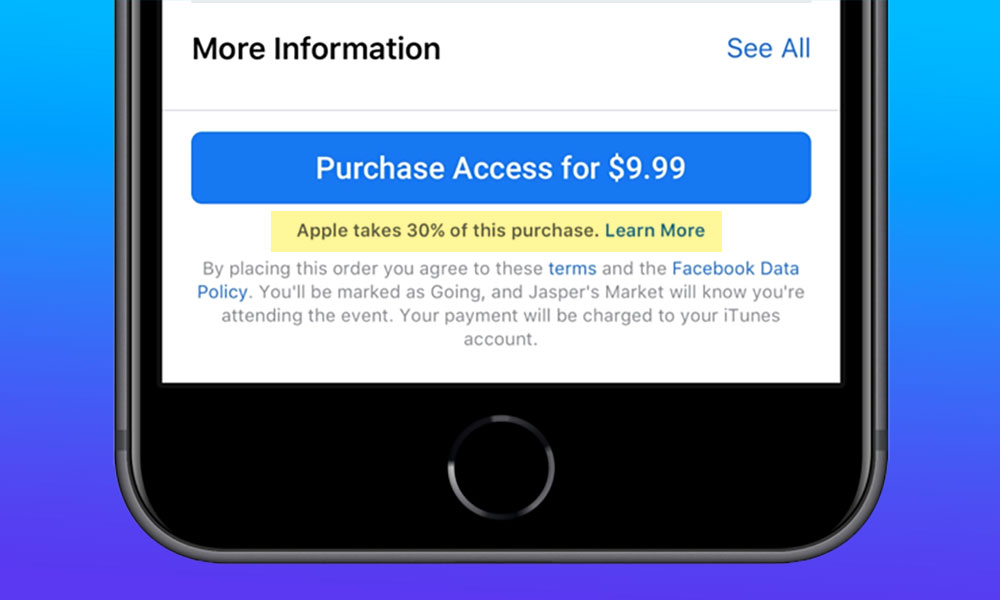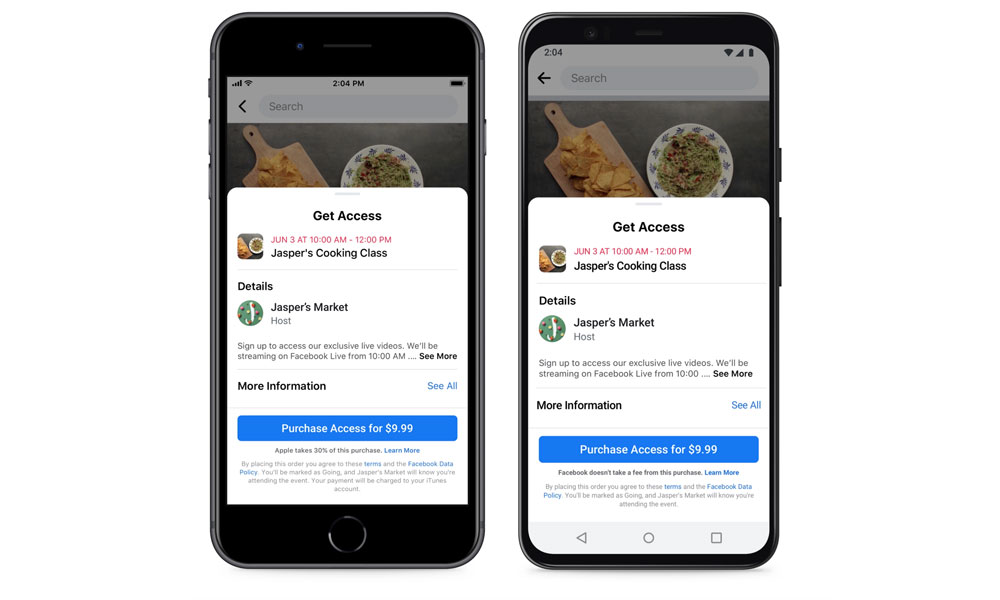Facebook Is Accusing Apple of Taking Money out of the Mouths of Small Businesses
 Credit: Facebook
Credit: Facebook
Toggle Dark Mode
New chapters keep unfolding in the battles being waged over Apple’s control of the App Store, and the latest contender to throw its hat into the fray is none other than Facebook, which is now calling out Apple for its unwillingness to waive its 30 percent App Store revenue cut in order to help out with a new effort to support struggling small businesses.
Facebook recently launched a new events feature designed to allow page owners — many of whom are freelancers and small businesses — to create paid online events to help them keep going while facing customer shortages and even physical business closures during the ongoing global health pandemic.
The new feature is being baked into the main Facebook app, and will allow page owners to “create an online event, set a price, promote the event, collect payment and host the event, all in one place,” with the goal of helping small businesses, and especially those in the entertainment and live event space find new ways to earn money in an era of physical distancing and lockdown measures.
In order to further help these small businesses and content creators, however, Facebook has also stated that it will waive all of the fees from paid online events for the next year, essentially giving 100% of the money collected to the business owners without taking a cut for itself. In cooperating with that spirit of generosity, Facebook asked Apple to do the same, but Apple has chosen to stick to its guns and not back down on its intransigent App Store rules.
We asked Apple to reduce its 30% App Store tax or allow us to offer Facebook Pay so we could absorb all costs for businesses struggling during COVID-19. Unfortunately, they dismissed both our requests and small businesses will only be paid 70% of their hard-earned revenue.
Fidji Simo, Head of Facebook app
Facebook suggested that Apple could either find some way to waive its normal 30% cut while still allowing the transaction to go through the App Store, or it could simply make an exception to its normal rules against in-app purchases going through other channels, allowing Facebook users to opt for Facebook Pay instead of the normal in-app purchasing system.
Calling Out Apple
Since Facebook wants to make sure end-users understand that the money that they’re contributing may not entirely go to the small business owners and creators, they stated that they’ll be making “other fees clear in the product,” which in the iOS version of the Facebook app will be a note that specifically states “Apple takes 30% of this purchase” as compared to Android devices, where the phrase in the same space says “Facebook doesn’t take a fee from this purchase.”
Facebook notes that the revised app has been submitted to Apple for approval, so it remains unclear if Apple is going to allow itself to be called out in this manner, but in a statement to The Verge, the head of Facebook’s main app, Fidji Simo, said that they felt it was “really important to be transparent when people are supporting small businesses” so that they know where their money is going.
When people are paying $20 for an online event, they think it’s all going to a local business when 30% is going to an almost $2 trillion company — that’s relevant information for people to have.
Fidji Simo, Head of Facebook app
Facebook’s complaint joins a recent chorus of other companies that have been railing against Apple’s ironclad control over the App Store and the 30 percent cut that it takes of pretty much every digital transaction that occurs in any given iOS app.
The issue came to a big head last week when Apple kicked the popular game Fortnite out of the App Store after developer Epic Games attempted to do an end-run around Apple’s in-app purchasing system — a move by Epic which turned out to be entirely a setup to initiate a lawsuit against Apple.
Facebook also locked horns with Apple last week over its refusal to allow cloud gaming apps in the App Store, which began with Microsoft’s Project xCloud and later extended to Facebook’s own gaming app, which had to be pared down to only showing game streams rather than including playable HTML5 mini-games.
Meanwhile, Apple also finds itself embroiled in several big antitrust investigations over its control of the App Store, and while the company continues to defend its App Store position on the basis that it’s not a monopoly and therefore has no real power to abuse, clearly there are a lot of other big tech companies — and smaller developers too — that would disagree.







